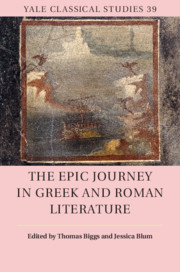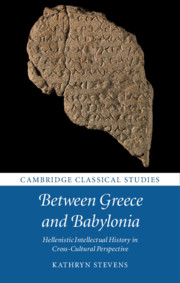Refine search
Actions for selected content:
60613 results in Classical studies (general)
EMPERORS AND PANEGYRIC - (A.) Omissi Emperors and Usurpers in the Later Roman Empire. Civil War, Panegyric, and the Construction of Legitimacy. Pp. xx + 348, ills, map. Oxford: Oxford University Press, 2018. Cased, £80, US$105. ISBN: 978-0-19-882482-4.
-
- Journal:
- The Classical Review / Volume 69 / Issue 2 / October 2019
- Published online by Cambridge University Press:
- 25 June 2019, pp. 565-567
- Print publication:
- October 2019
-
- Article
- Export citation
A SURVEY OF ORPHIC TRADITION - (D.A.) Meisner Orphic Tradition and the Birth of the Gods. Pp. xii + 318. New York: Oxford University Press, 2018. Cased, £55, US$85. ISBN: 978-0-19-066352-0.
-
- Journal:
- The Classical Review / Volume 69 / Issue 2 / October 2019
- Published online by Cambridge University Press:
- 25 June 2019, pp. 367-369
- Print publication:
- October 2019
-
- Article
- Export citation
TRADE AROUND THE INDIAN OCEAN - (M.A.) Cobb Rome and the Indian Ocean Trade from Augustus to the Early Third Century ce. (Mnemosyne Supplements 418.) Pp. x + 355, colour ills, maps. Leiden and Boston: Brill, 2018. Cased, €116, US$140. ISBN: 978-90-04-37309-9.
-
- Journal:
- The Classical Review / Volume 69 / Issue 2 / October 2019
- Published online by Cambridge University Press:
- 25 June 2019, pp. 540-542
- Print publication:
- October 2019
-
- Article
- Export citation
SPACE, MOVEMENT AND GENDER IN ANCIENT GREECE - (A.) Konstantinou Female Mobility and Gendered Space in Ancient Greek Myth. Pp. xiv + 189, ills, map. London and New York: Bloomsbury Academic, 2018. Cased, £75, US$102. ISBN: 978-1-4742-5676-6.
-
- Journal:
- The Classical Review / Volume 69 / Issue 2 / October 2019
- Published online by Cambridge University Press:
- 25 June 2019, pp. 522-523
- Print publication:
- October 2019
-
- Article
- Export citation
ANTIGONE AND ITS CONTEXT - (D.) Stuttard (ed.) Looking at Antigone. Pp. x + 247. London and New York: Bloomsbury Academic, 2018. Cased, £85, US$114. ISBN: 978-1-350-01711-5.
-
- Journal:
- The Classical Review / Volume 69 / Issue 2 / October 2019
- Published online by Cambridge University Press:
- 25 June 2019, pp. 380-383
- Print publication:
- October 2019
-
- Article
- Export citation
CLASSICS AND SOUTH AFRICA - (G.) Parker (ed.) South Africa, Greece, Rome. Classical Confrontations. Pp. xxii + 544, ills, colour pls. Cambridge: Cambridge University Press, 2017. Cased, £110, US$140. ISBN: 978-1-107-10081-7.
-
- Journal:
- The Classical Review / Volume 69 / Issue 2 / October 2019
- Published online by Cambridge University Press:
- 25 June 2019, pp. 652-655
- Print publication:
- October 2019
-
- Article
- Export citation
TEXTS ON THE MEMNON COLOSSUS - (P.A.) Rosenmeyer The Language of Ruins. Greek and Latin Inscriptions on the Memnon Colossus. Pp. xx + 265, maps, pls. New York: Oxford University Press, 2018. Cased, £55, US$85. ISBN: 978-0-19-062631-0.
-
- Journal:
- The Classical Review / Volume 69 / Issue 2 / October 2019
- Published online by Cambridge University Press:
- 25 June 2019, pp. 629-631
- Print publication:
- October 2019
-
- Article
- Export citation
THE CONCLUSION OF THE COMMENTARY ON AMMIANUS MARCELLINUS - (J.) Den Boeft, (J.W.) Drijvers, (D.) Den Hengst, (H.C.) Teitler Philological and Historical Commentary on Ammianus Marcellinus XXXI. Pp. xxvi + 362, maps. Leiden and Boston: Brill, 2018. Cased, €169, US$195. ISBN: 978-90-04-35381-7.
-
- Journal:
- The Classical Review / Volume 69 / Issue 2 / October 2019
- Published online by Cambridge University Press:
- 17 June 2019, pp. 478-480
- Print publication:
- October 2019
-
- Article
- Export citation
FRAGMENTS OF GREEK TRAGEDY - (M.) Wright The Lost Plays of Greek Tragedy. Volume 1: Neglected Authors. Pp. xxx + 277. London and New York: Bloomsbury Academic, 2016. Paper, £21.99 (Cased, £85). ISBN: 978-1-4725-6775-8 (978-1-4725-6776-5 hbk). - (M.) Wright The Lost Plays of Greek Tragedy. Volume 2: Aeschylus, Sophocles and Euripides. Pp. xii + 308. London and New York: Bloomsbury Academic, 2019. Paper, £19.99, US$26.95 (Cased, £65, US$88). ISBN: 978-1-4742-7647-4 (978-1-4742-7646-7 hbk).
-
- Journal:
- The Classical Review / Volume 69 / Issue 2 / October 2019
- Published online by Cambridge University Press:
- 17 June 2019, pp. 373-377
- Print publication:
- October 2019
-
- Article
- Export citation
NEW STUDIES ON THE GREEK NOVEL - (S.) Schwartz From Bedroom to Courtroom. Law and Justice in the Greek Novel. (Ancient Narrative Supplementum 21.) Pp. xiv + 270. Groningen: Barkhuis & Groningen University Library, 2016. Cased, €90. ISBN: 978-94-92444-08-0. - (T.) Whitmarsh Dirty Love. The Genealogy of the Ancient Greek Novel. Pp. xviii + 201. New York: Oxford University Press, 2018. Cased, £32.99, US$44.95. ISBN: 978-0-19-974265-3.
-
- Journal:
- The Classical Review / Volume 69 / Issue 2 / October 2019
- Published online by Cambridge University Press:
- 03 June 2019, pp. 421-425
- Print publication:
- October 2019
-
- Article
- Export citation
NEW PERSPECTIVES ON THE HISTORIA AUGUSTA - (E.) Savino Ricerche sull’Historia Augusta. Pp. xii + 341, b/w & colour ills. Naples: Naus Editoria, 2017. Paper, €50. ISBN: 978-88-7478-049-5. - (D.) Rohrbacher The Play of Allusion in the Historia Augusta. Pp. xiv + 246. Madison, WI and London: The University of Wisconsin Press, 2016. Paper, US$65. ISBN: 978-0-299-30600-7.
-
- Journal:
- The Classical Review / Volume 69 / Issue 2 / October 2019
- Published online by Cambridge University Press:
- 03 June 2019, pp. 480-484
- Print publication:
- October 2019
-
- Article
- Export citation

The Epic Journey in Greek and Roman Literature
-
- Published online:
- 31 May 2019
- Print publication:
- 23 May 2019

Between Greece and Babylonia
- Hellenistic Intellectual History in Cross-Cultural Perspective
-
- Published online:
- 29 May 2019
- Print publication:
- 23 May 2019
NETWORKED DELOS - (C.) Constantakopoulou Aegean Interactions. Delos and its Networks in the Third Century. Pp. xviii + 331, figs, maps. Oxford: Oxford University Press, 2017. Cased, £80, US$110. ISBN: 978-0-19-878727-3.
-
- Journal:
- The Classical Review / Volume 69 / Issue 2 / October 2019
- Published online by Cambridge University Press:
- 29 May 2019, pp. 514-516
- Print publication:
- October 2019
-
- Article
- Export citation
WAR AND DEMOCRACY IN CLASSICAL ATHENS - (D.M.) Pritchard Athenian Democracy at War. Pp. xxiv + 287, ills. Cambridge: Cambridge University Press, 2019. Cased, £75, US$105. ISBN: 978-1-108-42291-8.
-
- Journal:
- The Classical Review / Volume 69 / Issue 2 / October 2019
- Published online by Cambridge University Press:
- 29 May 2019, pp. 512-514
- Print publication:
- October 2019
-
- Article
- Export citation
SHOES IN THE ANCIENT WORLD - (S.) Pickup, (S.) Waite (edd.) Shoes, Slippers, and Sandals. Feet and Footwear in Classical Antiquity. Pp. xviii + 337, figs, ills, map. London and New York: Routledge, 2019. Cased, £115, US$140. ISBN: 978-1-4724-8876-3.
-
- Journal:
- The Classical Review / Volume 69 / Issue 2 / October 2019
- Published online by Cambridge University Press:
- 27 May 2019, pp. 631-634
- Print publication:
- October 2019
-
- Article
- Export citation
SHAKESPEARE AND REPUBLICAN ROME - (P.) Gray Shakespeare and the Fall of the Roman Republic. Selfhood, Stoicism and Civil War. Pp. xii + 308. Edinburgh: Edinburgh University Press, 2019. Cased, £80. ISBN: 978-1-4744-2745-6.
-
- Journal:
- The Classical Review / Volume 69 / Issue 2 / October 2019
- Published online by Cambridge University Press:
- 27 May 2019, pp. 636-638
- Print publication:
- October 2019
-
- Article
- Export citation
SPARTA AS SEEN BY THE ATHENIANS - (P.) Cartledge, (A.) Powell (edd.) The Greek Superpower. Sparta in the Self-Definitions of Athenians. Pp. x + 239. Swansea: The Classical Press of Wales, 2018. Cased, £65. ISBN: 978-1-910589-63-2.
-
- Journal:
- The Classical Review / Volume 69 / Issue 2 / October 2019
- Published online by Cambridge University Press:
- 27 May 2019, pp. 509-511
- Print publication:
- October 2019
-
- Article
- Export citation
MASS VIOLENCE IN REPUBLICAN ROME - (N.) Barrandon Les massacres de la République romaine. Pp. 441, ills, maps. Paris: Fayard, 2018. Paper, €23. ISBN: 978-2-213-67131-4.
-
- Journal:
- The Classical Review / Volume 69 / Issue 2 / October 2019
- Published online by Cambridge University Press:
- 27 May 2019, pp. 528-530
- Print publication:
- October 2019
-
- Article
- Export citation
THE UTILITY OF CONTEMPLATION IN ARISTOTLE - (M.D.) Walker Aristotle on the Uses of Contemplation. Pp. x + 261. Cambridge: Cambridge University Press, 2018. Cased, £75, US$99.99. ISBN: 978-1-108-42110-2.
-
- Journal:
- The Classical Review / Volume 69 / Issue 2 / October 2019
- Published online by Cambridge University Press:
- 27 May 2019, pp. 405-407
- Print publication:
- October 2019
-
- Article
- Export citation
